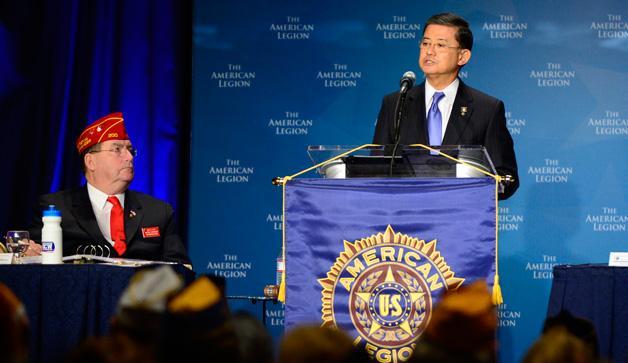The American Legion‘s annual Washington conference was this week, and VA Secretary Eric Shinseki was on hand to deliver a vital message: Veterans are well-prepared to rebuild the middle class, just as they did after World War II. The key component, he says, is education.
Shinseki challenged American Legion posts to communicate with local student veterans, and reinforce the importance of graduating from their colleges, universities and training programs. “The American Legion can be very helpful to us here, because all across the country where these youngsters are in school … the country needs them to do well, so encouragement to them would be helpfu,” he said.
Since 2009, VA has provided more than $25 billion in GI Bill education benefits to veterans, servicemembers, family members and survivors. VA is also working with the Student Veterans of America to track graduation rates of student veterans. Addressing those men and women who have served in uniform, Shinseki said, “There is no payoff to you, no payoff to the program, no payoff to the country if you don’t graduate.”
Education lies at the foundation for successful careers and a smooth transition from the military to the civilian world, so getting this part right is vital.
Check out the Legion recap for more on what we’re doing with VA-backed home loans, the claims backlog, and more.
Photo by Eldon Lindsay/American Legion
Topics in this story
More Stories
Summer Sports Clinic is a rehabilitative and educational sporting event for eligible Veterans with a range of disabilities.
Report examines the input of over 7,000 women Veterans: They are happier with VA health care than ever before.
Veterans and caregivers, you can help shape the future eligibility requirements for the VA Caregiver Support program.








I participated in the Voc Rehab program and the VA fired my first Voc Rehab counselor and suspended the school that I was attending, because they said that it cost too much. I called the head of the Seattle Voc Rehab Mr. Boyd and even wrote a letter to Sen. Patty Murray. Mr. Boyd said “Jesus” we don’t spend money like this on Veterans like you. I am an Honorably Discharged Disabled Veteran and was awarded the Armed Forces Expeditionary Medal. My second attempt was thwarted by my second Voc Rehab Counselor several times; until I fell down some stairs and broke my tail bone. Then she discontinued my Voc Rehab benefits, saying that I was too disabled. I am currently rated at 60 % service connected and I have been waiting two years to be reinstated but not even a return letter of my status even after writing several letters of inquiry. The VA is buried under so much red tape that they can’t even wipe their own noses without a congressional inquiry!
I would like to thank the VA for the VRAP program and the GI bill for giving this veteran a new mission to graduate from college and a chance to better serve the middle class of America.
Why is there no payoff? Is it because Shinseki said so? I know an education can be very important in career development. It is vital if you want a career in many professions. However, to say there is no payoff unless you graduate is (a) stigmatizing and (b) not necessarily true. I have known many successful people that did not complete their studies. Sometimes it was due to family or economic issues. Sometimes, it was a work ethic that would make them successful regardless of education. Some of examples come to mind (of people that made it in the real world), are Steve Jobs, Mark Zuckerberg, Bill Gates and Frank Loyd Wright.
Yes, we need to give the support we can to our new veterans. However, Shinseki could have made his point without basically telling them if you don’t complete your education, you have failed.